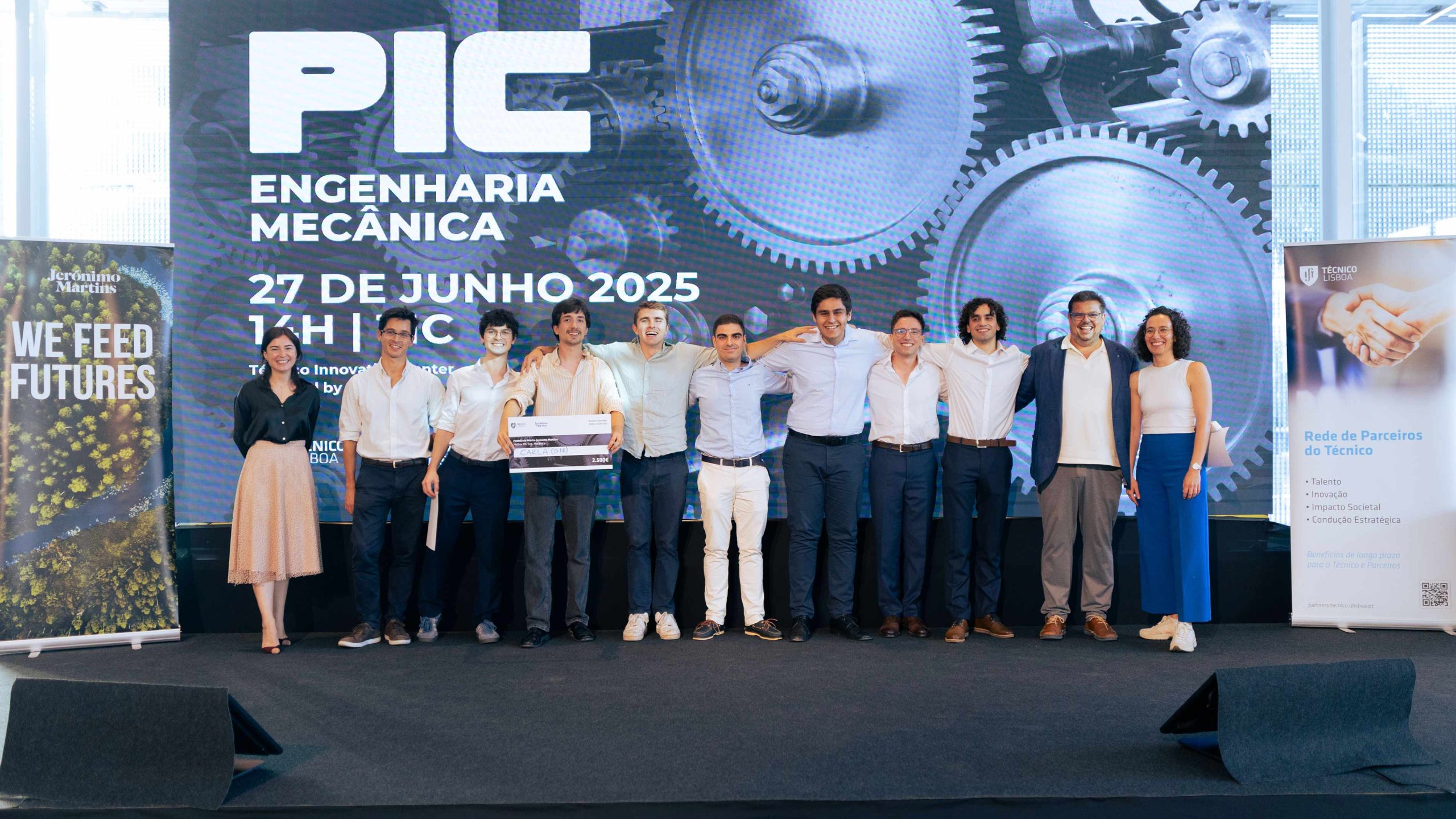PIC: Mechanical Engineering students showcase final projects that promote energy efficiency and sustainability
The symposium highlighted solutions developed within the 1st Cycle Integrative Project curricular unit and honoured three teams with prizes awarded by the Jerónimo Martins group.

The second Symposium of the Integrative Projects (PIC) of the Undergraduate Programme in Mechanical Engineering took place on 27 June at Técnico Innovation Center powered by Fidelidade. The event brought together 3rd year students, who showcased the projects developed during the 2nd semester of the 1st Cycle Integrative Project curricular unit.
The event featured oral presentation sessions and an exhibition of scientific posters, fostering knowledge sharing between the academic community and external partners. Three projects were recognised with prizes supported by the Jerónimo Martins group, a member of the Técnico Partner Network. The 1st place award went to the CARLA group for their project titled “Comboio Autónomo da Reabertura da Linha da Alfândega”, which proposed the development of an autonomous railway vehicle capable of accommodating 120 passengers to reactivate the line between Alfândega and Campanhã station in Porto. During the award presentation, the team spokesman emphasised the project’s impact, stating, “None of us left here the same as we came in. I’m very happy and proud of the work we’ve done. We all gave our all and aimed to do the best we could”. He also acknowledged the efforts of other participants, saying: “There could have been many other projects that received this award. There were fascinating presentations and outstanding work”.
Also receiving honourable mentions were the projects ‘MicroClean’, a miniature water treatment system for removing microplastics, and ‘Blue Carbon’, a digital tool that uses satellite images and sensors in the field to monitor biodiversity and carbon in the marshes along the Tagus estuary.
The students were divided into 19 groups, tackling specific technical challenges in areas such as energy efficiency, sustainability, automation, and mechanical design. They applied the knowledge acquired throughout their courses in an integrated manner, and their work was assessed by a jury comprising members from academia and industry.
Miguel Teixeira, President of the Pedagogical Council at Técnico, highlighted the importance of the educational value of the curricular unit in the context of reorganising study cycles. ‘When we were forced to separate undergraduate and master’s programmes, we felt a responsibility to offer students a professional experience after three years’, he said, recalling initial concerns about the students’ readiness for this challenge. “Fortunately, those fears were unfounded. Days like today prove exactly that”, he concluded, addressing the students with a clear message: ’Your potential is gigantic. The world, the country, has its eyes on you”.
Pedro Amaral, Vice-President for Corporate Interface, Innovation, and Entrepreneurship at Técnico, emphasised the symposium’s impact on student training. “It was a great pleasure to be here with you, to serve on this jury, and to see the incredible results showcased today”, he said, praising the involvement of the teaching and technical staff, as well as the students’ capacity for achievement. “The credit goes to our talents. Everyone present today—students and students’ organisations—demonstrated what being a member of the Técnico community means: commitment, creativity, and a desire to excel. Congratulations to all.”
During the closing session, João Paulo Fernandes, Head of the Department of Mechanical Engineering, received the Merit Award for Supporting the Improvement of Teaching Quality. He noted that PIC has strengthened the link between theory and practice, creating an enriching experience for both students and professors.
List of all the groups that participated in the symposium, in order of presentation:
- Group 1 – IST Gait
- Group 2 – PureWater
- Group 3 – CarbonSat
- Group 4 – PERRY
- Group 5 – Autonomous Vehicles: Driving the Future
- Group 6 – Red Horizon
- Group 7 – Transpraia Solar
- Group 8 – SlipTrack: Ammonia Emissions Monitoring System
- Group 9 – FireGuard: Semi-autonomous Vehicle for Wildfire Protection
- Group 10 – Composite Car’s Battery Cover
- Group 11 – AgroBuddy: Miniature Mobile Robot for Data Collection in Agriculture
- Group 12 – MicroClean: Sistema de Tratamento de Água em Miniatura para Remoção de Micro-plásticos
- Group 13 – Blue Carbon
- Group 14 – Manual Hospital Moover
- Group 15 – Future Truck
- Group 16 – Pursuit
- Group 17 – CARLA: Comboio Autónomo da Reabertura da Linha da Alfândega
- Group 18 – DUSTIQ: Particle Emissions Monitoring System for Braking Wear in Light Dutty Vehicle
- Group 19 – FireSafe: Advanced Unmanned Vehicle for Forest Fuel Reduction and Terrain Cleaning
Fórum Mecânica, as the main Students’ Organisation of Mechanical Engineering of Instituto Superior Técnico, also involved in this Symposium, marked the event with the following Video.
